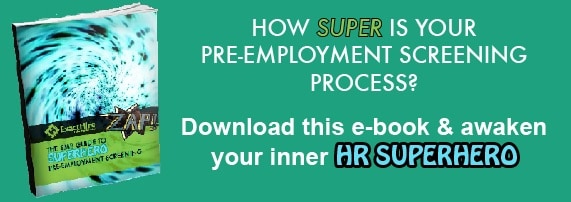Don’t Hire A Liar – Reference Check Tips
Have you ever looked at a resume and wondered if it was too good to be true? Unfortunately, sometimes that is a legitimate question.
Honesty is always the best policy. This not only applies to personal life, but to professional life as well. Recruiters have limited time to review resumes, so applicants need to convey positive attributes and display themselves in the best light possible on that piece of paper; however, lying–or even exaggerating–is unacceptable. Applicants should be aware that we are all interconnected in this digital age, and verifying resume content is easier than ever through reference and background checking.
Last summer, CareerBuilder conducted a survey of over 2000 employers. Fifty-eight percent of those employers surveyed stated that they had identified one or more lies on a resume. According to the survey, here are the most common lies caught on resumes:
Embellished Skill Set
Embellished Responsibilities
Dates of Employment
Inaccurate Job Title
Academic Degree
Companies Worked For
Accolades/Awards
Looking at some of those points above…candidates need to realize it is not difficult to verify one’s academic degree. By simply calling the Registrar’s Office of the higher education institutions listed on the resume, a recruiter can receive verbal confirmation from the school’s employee that the candidate did or did not graduate with degree XYZ. This information is considered “Directory Information”, and sharing that information is compliant with the Federal Educational Rights and Privacy Act (FERPA).
In some careers, particularly health professions careers, there are state and nationwide license verification websites that provide the initial date of certification, license expiration date, and any action taken against the individual’s professional license. All of this information is accessible to the public.
The Importance of Reference Checking
If you have moved through the channels with a candidate and seem impressed enough to prepare an offer, it is important to conduct thorough reference checks to get a better feel for the candidate from different perspectives. Reference checks provide a great opportunity to ask questions about a candidate and get feedback, ideally candid feedback, from other people who know the candidate. It is important to remember, though, that the references provided by the candidate are, in all likelihood, people who have agreed to give a glowing review. If possible, use your professional network to speak with other co-workers of the candidate to gain more in-depth perspectives. These individuals could give an entirely different view of the candidate.
Our ExactHire ATS employment application can be configured to include a section to acquire information from the candidate regarding his/her references. You can request any of the following items: Reference’s Name, Reference’s Company, Reference’s Phone Number, Reference’s Email, Reference’s Relationship to Applicant, and the Number of Years the Reference has Known the Applicant. You can even designate the number of references you want the applicant to provide.
Making A Plan For Reference Checks
You want to be consistent with the questions you ask of references for all your candidates. Always find out why the candidate left the position listed on their resume, and then consider using this list to guide your discussion (courtesy of HCareers and Laura Smoliar via Inc.):
- Verify the candidate’s dates of employment, title, and role.
- Is the candidate eligible for rehire? Why or why not? What was his or her reason for leaving?
- Determine the candidate’s advancement in the company. Did the candidate receive any promotions or demotions, or did the candidate remain in the same role throughout her tenure?
- What was the candidate’s beginning and ending salary? How often did the candidate receive salary increases?
- What kind of duties and responsibilities were assigned to the candidate? Did the candidate complete them satisfactorily? Did the candidate go above and beyond what was required without being asked?
- What were the candidate’s strengths as an employee? Would you describe the candidate a hard worker?
- Ask the reference to evaluate the employee’s performance the tasks likely to be assigned in the new position.
- Was the employee punctual? Were there any issues with tardiness or absenteeism?
- Did the employee get along well with her peers? With managers? With customers?
- Is there anything else I should take into consideration before I hire this candidate?
- Tell me about a time when the candidate had a conflict with a co-worker. How did the situation unfold?
- What kind of schedule did the candidate keep? Did co-workers ever have trouble working with the candidate because of schedule issues? Tell me about a time when this was a problem.
- Tell me about a time when the candidate surprised you. What were the circumstances? What did the candidate do?
- If you were to hire the candidate again, what role do you think would be ideal? What role would not be a good fit, and why?
- We all get frustrated with each other from time to time. Tell me about a time you were really frustrated with the candidate.
- In which situations does the candidate really shine? Tell me about an example.
- What else you’d like me to know about this individual?
It can be challenging to reach references by phone. Often when you do make contact with references, they can be hesitant to say anything that could be negatively construed or bring legal ramifications. But it is important to have a plan when calling, so that when you do make contact, you can collect useful information that supports strong hiring decisions
LinkedIn Research
If you take a look at a candidate’s LinkedIn page, you might be able to verify information found on the candidate’s resume. Furthermore, if you have mutual LinkedIn connections, those connections might be able to give you another perspective on the candidate’s professional background. But be cautious when using social media to review an applicant; you cannot discriminate against a candidate because of disability, age, gender, family, religion, sexual orientation, military history, employment status, or other protected categories.
Bottom line: any information that falls into a protected category cannot be used as a determining factor in offering a job to a candidate.
The Perfect Fit
There is no way to know 100% that a particular candidate is the best fit for a position or organization. But no matter how you check a candidate’s references, thoroughly evaluate the perspectives given to you from others and cross-reference that with your team’s professional views on the candidate. After analysis, if you feel like the candidate is going to be a good fit for the position and your organization as a whole, then you have utilized the information acquired during the reference check process to make a valuable decision and ideally a successful return on your investment.
Image credit: Pinotxo by azken_tximinoa (contact)









 15% OFF FULL-SERVICE HIRING • APPLICANT TRACKING SOFTWARE • ONBOARDING SOFTWARE
15% OFF FULL-SERVICE HIRING • APPLICANT TRACKING SOFTWARE • ONBOARDING SOFTWARE